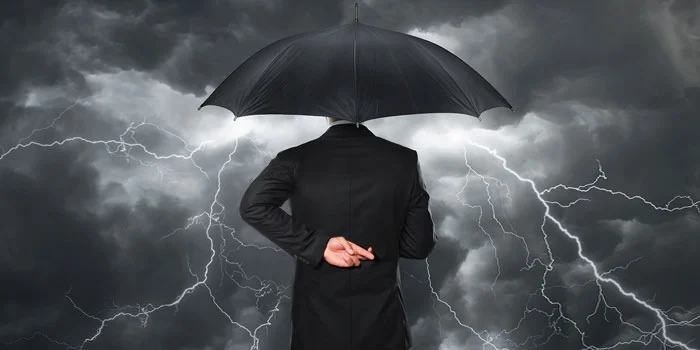Protect Yourself From Post-Storm Insurance Scams


In 2023 alone, there were more than 25,000 reports of severe weather involving tornadoes, wind or hail. Though most view the storm aftermath as a tragedy, roofing storm chasers and restoration company rip-off con artists view it as an opportunity. Many will travel to locations affected by severe weather and promise home repairs at inflated costs — and then do few (if any) repairs.
With plenty of unsuspecting victims expecting an inspection on their home soon after the storm, how can you differentiate storm scammers from legitimate inspectors? Identify contractor fraud and protect yourself from becoming a victim of a homeowners insurance scam artist.
Here’s how a typical roof scam works: After a storm hits your area, you receive a phone call or a knock on the door by someone who claims they are a roofing contractor. The scammer will pressure you to sign a contract on the spot or pay upfront. They will often offer to inspect your roof, but this is a scam, too — once up there, they often create even more damage so they can tally up a larger bill.
If you think your home has been damaged, your first call should be to your insurance agent to file a homeowners insurance claim. Your insurer will send out an adjuster to inspect the damage, and from there, you can get quotes from local, reputable roofing companies. Here are other tips to avoid falling victim to a roof or restoration company rip-off.
Be wary of anyone showing up or calling unexpectedly. If a contractor appears out of the blue, don’t sign anything or make any payments. The roof repair process should begin only after you’ve made the initial call to your insurance company. In the meantime, make temporary repairs to protect your home from further damage and keep your receipts.
Contact your insurance agent or claims center as soon as possible. If the storm or disaster was significant, teams of claims adjusters may be mobilized to speed the process. Your claims adjuster will determine the scope of the damage, which can help you determine if a contractor's estimate is reasonable. Your adjuster may be able to make a contractor recommendation.
Reputable contractors aren’t pushy or demanding. You should never be pressured into making a decision on the spot, and they should understand that getting multiple bids is a part of the process. If a contractor is overly aggressive in trying to secure your business right away, that’s a red flag. Get at least two written estimates to ensure you’re not the victim of price gouging and compare them carefully. Be sure to ask if there's a charge for estimates — honest contractors will provide estimates for free.
Checking a contractor’s background can help you save time, money and heartache. Avoid storm scammers by checking a contractor’s track record through your local Better Business Bureau, Home Builders Association or insurance claims adjuster. A reputable contractor will be licensed and bonded, and will be able to supply local operating permits as well as certificates of insurance for property, liability and workers compensation coverages. If a contractor claims they are from the government, check their ID. Jot down the information they provide and verify their information.
Check out online reviews on independent websites. If they claim they are endorsed by the Federal Emergency Management Agency (FEMA), think twice. FEMA doesn’t endorse contractors.
Get the details of your contract in writing, not just the cost estimate. Make sure it specifies the cost, time schedules, payment schedules, guarantees and any other expectations. Do not leave any portion of the contract blank — mark through blank lines as needed. If you don’t understand something, ask for an explanation and always keep a copy of the contract for yourself and refer back to it as work progresses.
A small initial deposit is reasonable, but trustworthy contractors will not ask for full payment before the work is complete. Determine who will pay the contractor for the work: you or your insurance company. If you pay the contractor, don’t pay with cash. Use a check or credit card and save receipts for reimbursement by your insurance company. Do not pay the contractor in full or sign a completion certificate until the work is completed to your satisfaction and in compliance with local building codes.
While home insurance and car insurance policies generally cover storm damage, it’s a good idea to review your coverage. Be proactive before severe weather hits.
Your local Farm Bureau agent is here to help. When you have damage to your home or property, your agent should be your first phone call. They will be able to help you with the claims process, and may help you find a local contractor for the work.